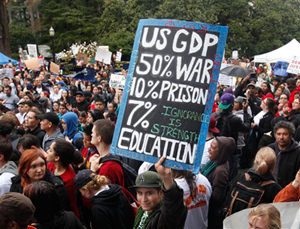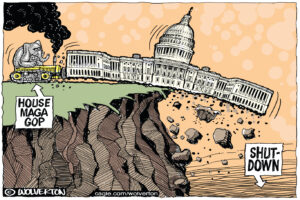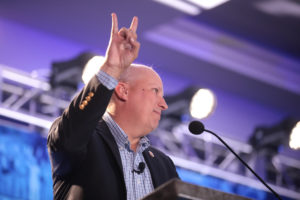Time for a Little Education
I’m a retired teacher and I’m pissed No matter what form of media I look at, I’m confronted with constant references to the various budget crises The crises are real, but the search for culprits has degenerated into a hypocritical attempt to score political points.
By Jim Mamer
’Tis much when scepters are in children’s hands;
But more when envy breeds unkind division;
There comes the rain, there begins confusion.
— William Shakespeare, “Henry VI”
I’m a retired teacher and I’m pissed. No matter what form of media I look at, I’m confronted with constant references to the various budget crises. The federal government has a deficit. States have budget problems. Cities face massive shortfalls. And school districts are on the edge of bankruptcy. The crises are real, but the search for culprits has degenerated into a hypocritical attempt to score political points.
Predictably we are faced with very different narratives of how we got here. While some are complex and worthy of debate and discussion, others are little more than a search for scapegoats. Take, for example, what comes from an increasingly shrill conservative chorus. After eliminating most of the usual suspects, the source of our fiscal problem becomes pretty simple. Our debts can’t be the cumulative result of multiple tax cuts. The crisis has nothing to do with our ongoing, unnecessary and counterproductive wars. It can’t be the fault of the bankers and brokers who defrauded millions with securitized debt obligations based on bundling large numbers of “liars’ loans.” It probably has nothing to do with our failure to tax most Internet sales, and it certainly can’t be because hedge fund managers are allowed to treat a portion of their income as capital gains.
Instead, the cause identified by most Republican governors, legislators and pundits is simple; government spends too much, and a lot of the blame falls on the public service unions. Indeed, at the recent Conservative Political Action Conference (CPAC) in Washington, D.C., one panel was titled “Bleeding America Dry: The Threat of Public Sector Unions.” That’s right: The firefighters, the police and the teachers are bleeding the country dry. They are paid too much and have way-way-too-generous benefits. They should be ashamed of themselves, their unions and their pensions.
I’m not ashamed, not even a little; I’m just tired of the bullshit. Don’t bother thinking that “in this economy, everyone is suffering.” That’s a lie. It’s not even close to true. On the contrary, the richest among us have gotten a whole lot richer. Even those recently bailed-out Wall Street bankers. In 2009, according to Bloomberg Businessweek, “After bringing the world to the brink of economic disaster, major investment banks are planning to pay their people 30% more than last year in salary plus bonus.” And in the same year, Executive PayWatch reported that a chief executive officer of a company on the S&P 500 index was paid, on average, $9.25 million in total compensation. Two of the biggest winners were Bank of America’s Thomas Montag, with a total compensation of $29,930,431, and Wells Fargo’s John Stumpf at $21,340,547. (From an AFL-CIO analysis of 292 companies in the S&P 500 Index.)
Clearly, there is money enough to fix our problems, but if one listens to the ever-present right-wing chorus, income inequality is only to be praised. It’s God’s will. The plutocrats deserve everything they have. They work harder and smarter than the rest of us. In fact they work so hard that even their kids will deserve the money when Mom and Dad die. Tax-free. But the teachers, the firefighters and the cops don’t deserve any breaks. They get too much. They have too many negotiated contracts, too much pay and too many benefits.
While it goes without saying that anti-union propaganda has a long and shameful history in this country, the current wave of coordinated Republican-led attacks on public-worker unions is still appalling. Naturally we should have seen it coming because the newest attacks on public service unions were developed in the context of other, often successful, attacks on unions of all types. It’s a story worth remembering. With globalization, countless American industrial jobs were relocated to countries with lower wages and ineffective or nonexistent unions. This led to increased U.S. unemployment, increased underemployment and a diminished middle class. Problems were inevitable. Still, despite deindustrialization, good union jobs remained. They paid living wages and still seemed to offer secure benefits. As such they made tempting targets; as the anti-union case was made publicly, the attack was refined. According to some, for example, the failure at GM was not the result of bad cars or poor management; it was the fault of greedy unionized autoworkers. Too many negotiated contracts, too much pay, too many benefits.
A pattern developed. In 2001, when the formerly powerful Bethlehem Steel Corp. declared bankruptcy, at least part of the blame was laid on the unions. They had taken unfair advantage of a naive and well-meaning management. They had demanded too much. Accordingly, the following year the company was allowed to terminate its pension obligations, which were then assumed by a federal agency, the Pension Benefit Guaranty Corp. The pensions eventually paid to retired workers were often drastically (and legally) reduced. In 2005, the then-bankrupt United Airlines received court permission to terminate its pension plans for the various unions representing pilots, flight attendants and mechanics and other ground service workers. This released the airline from more than $3 billion in obligations and put a reduced pension responsibility on the Pension Benefit Guaranty Corp. Other airlines, and other corporations, sought and received the same treatment.
But consider who was at fault when it is clear that all of these “too-generous” retirement plans had been negotiated among and between privately owned companies and unionized workers. Is it not obvious that all parties knew the terms of the contacts? Is it not obvious that the amount of money needed to properly fund these agreements could have been discovered by anyone with minimal math skills and a calculator? It was never the unions, but the companies that purposefully failed to adequately fund their obligations and then found legal ways to renege on their promises. In subsequent years most of these corporations switched their remaining employees from the more secure defined-benefit retirement programs to various defined-contribution plans like 401(k)s. This reduced corporate responsibilities and also tossed the fate of the affected to the uncertainties of Wall Street. Cumulatively the blows to jobs and to secure retirements affected millions. After globalization and deindustrialization drastically reduced the number of American jobs, membership in industrial unions dropped accordingly. After corporate bankruptcies stripped workers of what they had been promised, the power of unions diminished. As fewer and fewer private sector workers were unionized, the private/public balance was reversed and, by 2010, a majority of union members were government workers. As The New York Times reported, “… membership fell so fast in the private sector in 2009 that the 7.9 million unionized public-sector workers easily outnumbered those in the private sector, where labor’s ranks shrank to 7.4 million, from 8.2 million in 2008.”
When the preponderance of union membership shifted to those working for government the stage was set for another struggle about the nature of American society, even about the meaning of the American past. Omnipresent conservative commentator Ann Coulter recently summarized the narrative of the right: “… public sector employees got themselves terrific overtime, holiday, pension and health care deals through buying politicians with their votes and campaign money. But now, responsible elected officials in Wisconsin are trying to balance the budget.” But despite Coulter’s certainty, this battle is not primarily about the budget; it is about the power of working people to participate in determining their own fate.
This attack on the unions aims to destroy the very organizations that provide workers with a unified voice and make negotiation possible. Regardless of whether the fight is in Wisconsin, Tennessee or Minnesota, the current strategy on the right is to divide the public by sowing confusion, envy and anger while manipulating the confusion and anger already present in those continuing to reel from the recession, from official unemployment of almost 10 percent, from the continued lack of heath insurance and from the ongoing housing crisis. The point is to focus anger away from the plutocrats, away from the bankers and brokers of Wall Street, away from their protectors in Washington, and toward those who still benefit from the power of unions. Why not blame the teachers, firefighters and cops?
For many of us this situation has become personal and has been manifested in countless conversations. I’ve had such discussions with those in my own family who face an uncertain or nonexistent retirement, and I appreciate their frustration and anger, but I worry when their reaction is to suggest that, if they face uncertainty, I should too. Such an argument may appear rational (“Since I’ve worked just as hard as you, why should I suffer while you don’t?”), but the solution of making everyone poorer and unable to count on a secure retirement is self-defeating, even crazy.
I’m persuaded that far too many Americans have grown accustomed to a mythology of anti-union individualism. We need to reverse that. In our conversations we should remind others that unions built the American middle class; that the benefits of organized labor are a public good to be fought for and protected. We need to insist that the right to organize is fundamental to a democratic society. We need to insist that teachers, firefighters and cops have a right to negotiated wages and secure retirements, but we need to add that so does everyone else. No one who works should be denied a good negotiated wage. No one who has worked for 30 or 40 years should be denied a safe retirement. When envy breeds unkind division … there begins confusion. In “Henry VI” this line is spoken by the Duke of Exeter as he cautions those around him to fear the power of envy. It is advice we should all take to heart.
Your support matters…Independent journalism is under threat and overshadowed by heavily funded mainstream media.
You can help level the playing field. Become a member.
Your tax-deductible contribution keeps us digging beneath the headlines to give you thought-provoking, investigative reporting and analysis that unearths what's really happening- without compromise.
Give today to support our courageous, independent journalists.






You need to be a supporter to comment.
There are currently no responses to this article.
Be the first to respond.